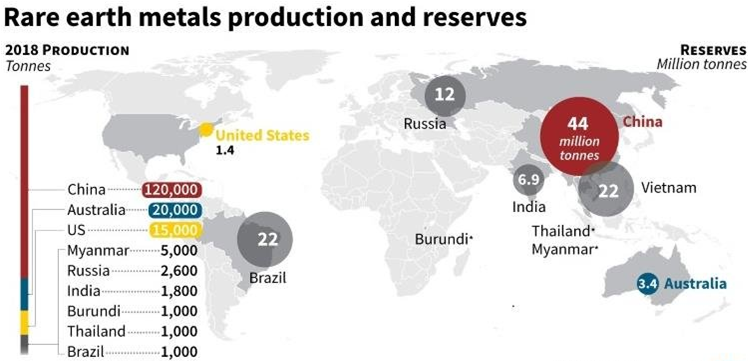“As to how effective this amendment will be, it remains to be seen,” she added, because the law is “largely reliant on companies self-reporting their transactions that may trigger a need for prior approval from the regulator,” though authorities can investigate and unwind unreported transactions if necessary.
Core industries for national security. Japan had already amended FEFTA in 2019 to designate 500 companies across 12 “core” industries to be subject to the most stringent foreign investment rules. Any foreign individual or firm looking to acquire a 1% stake in companies that are part of the “core” sectors critical to national security would have to undergo a an official approval process. The 1% threshold had been slashed from 10%.
The 12 core industries (pdf) designated under the 2019 amendment included weapons, aircrafts, space, cybersecurity, electrical power, gas, and oil. Companies classified for stringent protections include Hitachi Metals, a leading permanent rare earth magnet maker; the auto giant Toyota; Shin-Etsu Chemical, which makes silicon wafers for semiconductors; but also the snacks manufacturer Calbee, famous for its addicting potato chips, prawn crackers, and corn fries.
Protecting the critical metals and rare earth sectors
Now, Japan wants to add rare metals-related sectors to the list of core industries. Semiconductors, advanced electric vehicle batteries, and medical supplies are also expected to be designated as key to economic security under the amended legislation, according to Japan Times. The amendments are currently under public consultation and are expected to take effect later this year, according to Argus Media, an energy and commodities data provider.
Japan is heavily reliant on imports for rare earths, though over the past decade it has successfully reduced dependence on China by diversifying its sources.
Japanese companies also own important intellectual property related to the production of permanent rare earth magnets, which are vital components in electric vehicles and wind turbines. The trove of valuable IP potentially makes Japanese firms attractive targets of takeovers by adversaries or competitors of Japan. Hitachi Metals, for example, holds “a significant portfolio of rare earth magnet patents,” according to the law firm Allen & Overy, and was recently put on sale by its parent Hitachi. In April it accepted an offer with a strong Japanese component—the bid from a US-Japanese consortium led by Bain Capital.
Meanwhile, a search of the World Intellectual Property Organization’s patent database shows that Japan holds the highest number of registered patents with the words “rare earth magnet” in the patent title.
Another way in which the latest amendments to designate rare metals as a protected core industry can help Japan is to allow it to potentially qualify for preferential treatment under US foreign investment rules.
The Committee on Foreign Investment in the United States (CFIUS) reviews certain foreign investments, and for foreign investors who have to comply with full CFIUS reporting requirements, the process can be time-consuming and costly. However, “excepted foreign states”—currently limited to Australia, Canada, and the UK—are exempt from the most stringent CFIUS rules. By demonstrating its commitment and ability to set up a robust mechanism to screen foreign investments for national security risks, however, Japan may increase its chances of getting on the so-called CFIUS “white list.”
“Japan’s efforts to strengthen its investment screening mechanisms with amendments to the FEFTA may possibly be carrying with it the additional hope of being considered an excepted foreign state for US law purposes, but again, the U.S. has not yet included Japan in the list of excepted foreign states,” explained Scanlan-Dyas of Hogan Lovells.
Source:https://finance.yahoo.com/news/japan-defending-rare-earth-industry-100058079.html

 English
English


